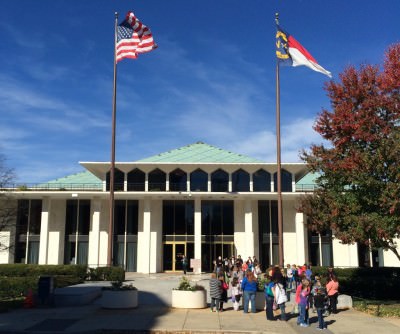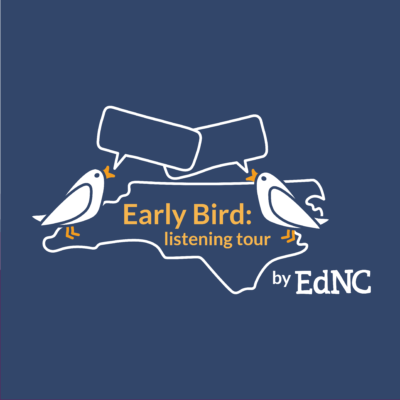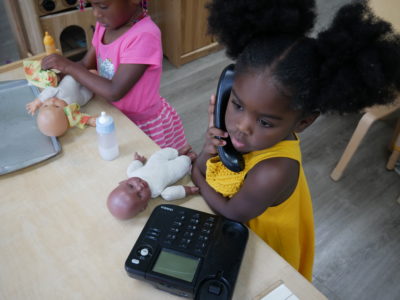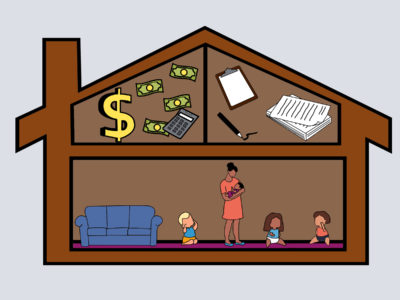
After a tough year for young children, their families, and their educators, early childhood advocates are pushing for state policies and resources from this legislative session to support the education and development of North Carolina’s youngest learners through the pandemic and beyond.
From changes in the child care subsidy program to early educator pay raises and family-friendly workplace policies, the early learning community is hoping the long session addresses longstanding issues. They also hope it recognizes the value of early educators, many of whom worked in-person throughout the year.
“The pandemic has shone a bright light on the importance of early care and education, and we can’t lose that momentum,” said Amy Cubbage, president of the North Carolina Partnership for Children, the statewide organization representing 75 local Smart Start partnerships. “Programs that support families and parents have kept so many from falling even farther behind.”
Advocates say the pandemic has also shown that early childhood investments have multigenerational benefits and are not only important for children’s learning but are crucial to the state’s economic recovery.
North Carolina parents, businesses, and the economy had been losing about $2.4 billion annually from inadequate early care and education, a December report from the North Carolina Early Childhood Foundation (NCECF) estimated. During the pandemic, that number rose to $2.9 billion.
“Parents are sharing that due to inadequate child care, they’re having trouble finding work or are able to spend less time working and building job-related skills,” NCECF Executive Director Muffy Grant said in a press release. “In turn, this harms businesses and our economy.”
Joseph Kyzer, communications director for the office of House Speaker Tim Moore, R-Cleveland, said the General Assembly is in a better financial position than legislators in other states and is looking for ways to expand early learning access.
“Broadly speaking, lawmakers are fortunate to be able to take an approach that’s going to build on significant reform and increased funding that education leaders in the General Assembly have put together over the last several budget cycles,” Kyzer said. “There’s been a real budget focus to clear waiting lists and to make sure that we have stability to guarantee recurring increases that we know are going to be needed to meet population growth.”
Kyzer added that he expects a legislative focus on remedial support for children who have lost time in classrooms. Senate President Pro Tempore Phil Berger, R-Rockingham, said he would support early childhood investments but does not yet know whether they will be financially possible.
“We are still trying to get a good handle on what our going-forward revenue projections are,” Berger said in an interview with EdNC. “I’m comfortable and confident that we are not going to see any cuts, particularly in [early childhood education and child care], but whether we will be in a position to provide additional resources so that we expand the opportunities for kids really remains to be seen.”
Rep. Ashton Clemmons, D-Guilford, said a bipartisan, bicameral early childhood legislative caucus is in the works, though its membership and policy priorities are still to be determined. The group will focus on issues affecting children from before birth to 8 years old, Clemmons said.
“If we think about the economic wellbeing of our state and the individual outcomes for the people of our state, investing in early childhood is really the best way to use our resources to positively impact outcomes,” she said.
From priorities and predictions of outside advocacy organizations, government agencies, and legislative committees, these are the early childhood issues most likely to arise in this session.
Early care and education
Short-term relief
As many child care providers continue to struggle with decreased enrollment and the stress and costs of coronavirus surges, advocates are concerned access will worsen without major investment. Go here to see the percentage of child care facilities open by county in November.
Before the pandemic, 44% of North Carolinians lived in a child care desert, defined as a census tract with three or more children per licensed child care slot, according to The Center for American Progress.
“If we don’t invest now, in two years, we’re going to have a bunch of big empty buildings and no child care,” said Marsha Basloe, president of the Child Care Services Association (CCSA).
The federal stimulus package, signed into law at the end of last year, provides $10 billion in child care relief through the Child Care and Development Block Grant (CCDBG), as well as $250 million for Head Start and $284 billion in small business loans through the Paycheck Protection Program. The Center for Law and Social Policy estimates North Carolina will receive $338,767,639 in CCDBG funds.
Susan Gale Perry, chief deputy secretary at the Department of Health and Human Services (DHHS), said the Division of Child Development and Early Education (DCDEE) plans to use those funds to help providers with lost revenue through operational grants, to cover parent co-pays for those receiving subsidy assistance, and to give several rounds of bonus payments to early childhood staff. The division also will look at support for children who lost learning time, like summer enrichment opportunities, she said.
“I think this amount is going to go a long way to shoring up the industry,” Perry said. “I always think there’s greater need. Some of it is just … quite honestly, the unpredictability. Right now, we’re seeing some of our highest case numbers and I think the next few months are going to be very hard for folks.”
State resources are also needed, said Beth Messersmith, senior campaign director for the North Carolina chapter of MomsRising.
“If the state only waits on the federal government, that’s not going to be enough,” Messersmith said. “North Carolina was underfunding the early learning sector anyway, before the pandemic, and we are going to have to prioritize funding it moving forward. It’s going to take the federal government and it’s going to take state government leadership as well.”
Long-term sustainability
Several early childhood advocacy organizations are rallying around changing the way the state allocates child care subsidy funds. The subsidy program, paid for with a mix of federal and state dollars, helps low-income working parents pay for child care.
The rates providers receive for serving children in the program vary widely depending on geography. They’re better indicators of what parents in the area can afford than of what it costs to provide high-quality care and education, said Alexandra Sirota, director of the Budget and Tax Center, the fiscal policy arm of the left-leaning N.C. Justice Center. That means providers in lower-income areas often receive less but are held at the same standards of quality.
For a deeper dive into this issue, check out the article below.
A statewide floor rate would mean counties that have lower rates would adopt the state average, and counties with higher rates would maintain their current rates. Sirota says this would take around $70.6 million.
“We’re really approaching this from an equity perspective, acknowledging that setting market rate at the average will create greater equity in funding across state,” said Elizabeth Byrum, a campaigns specialist at NC Child. “Now more than ever, providers are struggling to stay open because of inadequate revenue, and we’re not sure exactly what recovery will look like related to child care.”
Byrum emphasized this would be a strategy to “set us up to more longer-term sustainable planning for early childhood education.”
Early educator compensation
In 2019, early childhood programs in centers and schools paid starting teachers an average of $10.50 per hour with programs’ highest salary at an average of $15 per hour, according to CCSA’s Early Childhood Workforce Study. Assistant teachers’ wages averaged between $10 and $12 per hour. Almost 40% of teachers and assistant teachers, as well as 16% of family child care providers, had received some kind of public assistance.
Michele Rivest, senior campaign director of the NC Early Education Coalition, said one of the group’s top priorities is changing those realities. She said this session could see at least two different strategies to do so.
In the 2019-20 session, House Bill 882, “An Act to Enhance the Early Childhood Workforce,” unanimously passed the House, then died in the Senate. On top of requiring education certificates for early childhood teachers, the bill would have paid centers if they had a salary scale in place based on education levels and only hired teachers who had at least associate degrees in child development or a related field. This approach might come up again this year.
Another option, Rivest said, is establishing a statewide salary supplement program for early educators with associate degrees. The AWARD$ program, paid for by DCDEE and administered by CCSA, currently serves only infant/toddler teachers. Rivest said expanding the program to all teachers would strengthen the workforce.
“We’re trying to save our child care workforce that has degrees and is qualified to teach in early childhood education,” Rivest said.
Supports for working parents
As parents have struggled more than ever to balance work and caring for their children during the pandemic, Messersmith says the past year has highlighted the need for policies that make both possible.
There are several policies, many of which have been introduced in past sessions, that advocates hope could garner bipartisan support this year.
Workplace accommodations for pregnant employees, which Virginia and Tennessee have adopted over the past year, were included in a 2019 bill and are a priority for several organizations, such as the NC Early Education Coalition, MomsRising, and NC Child.
Also in 2019, legislation that would create a family and medical leave insurance program died in committee. Bills that would allow workers to earn a minimum number of sick days and to use earned sick days to care for a sick family member or seek services related to domestic or sexual violence were also filed in 2019 but did not pass.
“No matter what party you’re from, people have caregiving needs,” Messersmith said. “They have family members. They get sick themselves. And that was all true before the pandemic, but I think that it has shown a really bright light on the fact that these are not niceties, these are essential.”
Most of these policies are also endorsed by The Child Fatality Task Force, a legislative study commission that makes annual recommendations on “how to reduce child death, prevent abuse and neglect, and support the safety and well-being of children.”
At the task force’s January meeting, a recommendation from a subcommittee to create a family leave insurance program was not passed. Multiple legislators thought there had not been enough input from the business community.
“I don’t want to add any more complications on them,” said Sen. Jim Burgin, R-Harnett/Johnston/Lee, speaking of businesses struggling from the pandemic.
Family-friendly workplace policies are also a focus for Prevent Child Abuse North Carolina. Paid parental leave in particular is beneficial for child and family wellbeing, said Melea Rose-Waters, the organization’s policy director.
“In relation to preventing child maltreatment, early on, that’s when the bonding happens,” Rose-Waters said. “It’s such a key period of brain growth for the child and also bonding for parents with their child. Thinking about going to work two weeks after birth and how stressful that could be for a family … can just become a risk factor.”
Leandro
Many early childhood advocates and agencies are also supporting progress toward recommendations from WestEd, an outside consultant ordered by the court to study what changes are necessary for the state to meet its constitutional mandate to provide every child with a sound, basic education.
The WestEd report was released in December 2019 and is the result of a lawsuit stemming back to 1994, when parents from five low-wealth districts sued the state, claiming their children were not receiving the same educational opportunities as children in wealthier districts. The state Supreme Court has since established that children have a fundamental right to a sound, basic education and that the state had not lived up to that requirement. Go here for more information on the lawsuit’s history, as well as EdNC’s coverage of the case in recent years.
In January, Superior Court Judge David Lee signed a court order endorsing the WestEd findings and calling on parties to present concrete next steps. Strengthening the state’s early childhood education system was one of the order’s seven priority areas.
Lee signed another order in September that outlined recommendations for fiscal year 2020-21, including $35,650,000 in additional state early childhood education investments. The full plan is below.
The plan prioritized increasing rates that providers receive for NC Pre-K, the state’s public preschool for 4-year-olds. In recent years, legislators have given recurring increases in funding for the program, which targets “at-risk” children mainly by income. Yet barriers to expansion exist in many places in the state, including the stagnant reimbursement rate.
In 2018, a group of North Carolina business leaders commissioned a report from the National Institute for Early Education Research (NIEER) when several counties declined expansion dollars from the legislature. In 2019, the General Assembly passed a law requiring DHHS to further study why some NC Pre-K sites can’t expand and why other sites don’t offer the program at all.
DHHS paid the Frank Porter Graham Institute at UNC-Chapel Hill to do that study, released in February 2020. Along with too-low reimbursement rates, sites said lack of transportation funds, classroom space, and finding and paying qualified teachers were challenges. DHHS outlined many of these findings to the Joint Legislative Oversight Committees on Health and Human Services and Education in June.
The Leandro plan also recommended studying the cost of a high-quality learning program and alternative methodologies for child care subsidy reimbursement.
The plan calls for the expansion of the NC Infant-Toddler program, increasing Smart Start funding, expanding education-based salary supplements for early educators in high-poverty districts, strengthening transitions from early childhood to elementary systems, and funding an early childhood workforce data system.
Multiple bills based on recommendations related to Leandro were filed in the House last year, but none were passed.
“It’s time for the state to begin investing in those early childhood priorities,” said Rivest, later adding: “It’s different than the annual debate about how much we’re going to spend on K-12 or invest in teachers. That’s part of it, but Leandro is a comprehensive look at the failure of the state to provide a sound, basic education. Really, it’s a framework for all future investments the state should make. It’s the obligation of policymakers, not the hope of advocates, that policymakers will take this seriously.”












